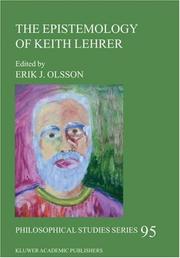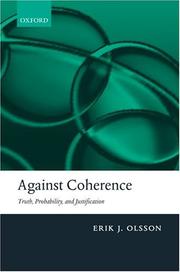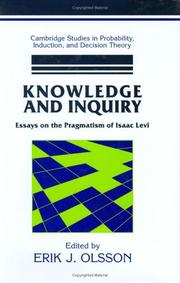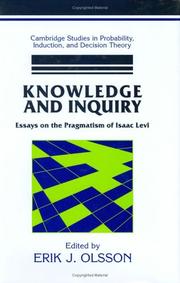| Listing 1 - 10 of 21 | << page >> |
Sort by
|

ISBN: 1402016050 9401039976 9401000131 Year: 2003 Volume: 95 Publisher: Dordrecht Kluwer Academic Publishers
Abstract | Keywords | Export | Availability | Bookmark
 Loading...
Loading...Choose an application
- Reference Manager
- EndNote
- RefWorks (Direct export to RefWorks)
Keith Lehrer is one of the leading proponents of a coherence theory of knowledge that seeks to explain what it means to know in a characteristically human way. Central to his account are the pivotal role played by a principle of self-trust and his insistence that a sound epistemology must ultimately be ecumenical in nature, combining elements of internalism and externalism. The present book is an extensive, self-contained, up-to-date study of Lehrer's epistemological work. Covering all major aspects, it contains original contributions by some of the most distinguished specialists in the field, outgoing from the latest, significantly revised version of Lehrer's theory. All basic ideas are explained in an introductory chapter. Lehrer's extensive replies in a final chapter give unique access to his current epistemological thinking.
Epistemology. --- Modern philosophy. --- Modern Philosophy. --- Modern philosophy --- Epistemology --- Theory of knowledge --- Philosophy --- Psychology

ISBN: 0199279993 9780199279999 0191602663 0199550514 9786611198558 0191535583 1281198552 143562386X Year: 2005 Publisher: Oxford Clarendon
Abstract | Keywords | Export | Availability | Bookmark
 Loading...
Loading...Choose an application
- Reference Manager
- EndNote
- RefWorks (Direct export to RefWorks)
Theory of knowledge --- Skepticism --- Truth --- Coherence theory of truth --- Scepticism --- Unbelief --- Coherence theory --- Agnosticism --- Belief and doubt --- Free thought

ISBN: 0521845564 052131447X 0511584318 0511279779 Year: 2006 Publisher: Cambridge : Cambridge University Press,
Abstract | Keywords | Export | Availability | Bookmark
 Loading...
Loading...Choose an application
- Reference Manager
- EndNote
- RefWorks (Direct export to RefWorks)
Isaac Levi has explored the principles of American pragmatism in greater depth and more consistency than others before him. The result is a sophisticated and powerful philosophical system whose key elements stand in stark opposition not only to mainstream epistemology, but also to the positions of other contemporary authors writing in the same pragmatist tradition. The essays in this volume, written by some of philosophy's finest scholars, contribute substantially to the understanding and appraisal of Levi's work. Included in this volume are Levi's extensive and provocative replies to his critics, which offer access to his thinking on a wide range of topics. The introduction provides a concise, systematic presentation of the cornerstone of Levi's pragmatism. Suitable for students and scholars who are interested in American pragmatism in general and Isaac Levi's work in particular, this book is an ideal companion to Levi's own writings.
Pragmatism --- Idealism --- Knowledge, Theory of --- Philosophy --- Philosophy, Modern --- Positivism --- Realism --- Utilitarianism --- Experience --- Reality --- Truth --- History --- Levi, Isaac, --- Arts and Humanities
Book
ISBN: 1009055127 1009053329 1009062379 1009062565 Year: 2022 Publisher: Cambridge : Cambridge University Press,
Abstract | Keywords | Export | Availability | Bookmark
 Loading...
Loading...Choose an application
- Reference Manager
- EndNote
- RefWorks (Direct export to RefWorks)
Perhaps the most fundamental question of epistemology asks on what grounds our knowledge of the world ultimately rests. The traditional Cartesian answer is that it rests on indubitable facts arrived at through rational insight or introspection. Coherentists reject this answer, claiming instead that knowledge arises from relations of coherence or mutual support: if our beliefs cohere, we can be sure that they are mostly true. The first part of this Element introduces the reader to the main ideas and problems of coherentism. The next part describes the 'probabilistic turn', leading up to recent demonstrations that coherence fails to be conducive to truth. The final part reassesses the current debate about the proper definition of coherence from the standpoint of Rudolf Carnap's methodology of explication. The upshot is a tentative and qualified defence of one of the early coherence measures.
Knowledge, Theory of. --- Truth --- Coherence theory. --- Coherence theory of truth --- Epistemology --- Theory of knowledge --- Philosophy --- Psychology
Book
Year: 2007 Publisher: Dordrecht: Springer,
Abstract | Keywords | Export | Availability | Bookmark
 Loading...
Loading...Choose an application
- Reference Manager
- EndNote
- RefWorks (Direct export to RefWorks)

ISBN: 9780521314473 9780511584312 9780521845564 Year: 2011 Publisher: Cambridge : Cambridge university press,
Abstract | Keywords | Export | Availability | Bookmark
 Loading...
Loading...Choose an application
- Reference Manager
- EndNote
- RefWorks (Direct export to RefWorks)
Pragmatism --- History --- Levi, Isaac,
Book
ISBN: 9781009053327 9781009055123 Year: 2022 Publisher: Cambridge Cambridge University Press
Abstract | Keywords | Export | Availability | Bookmark
 Loading...
Loading...Choose an application
- Reference Manager
- EndNote
- RefWorks (Direct export to RefWorks)
Book
ISBN: 9155439748 Year: 1997 Publisher: Stockholm Almqvist and Wiksell
Abstract | Keywords | Export | Availability | Bookmark
 Loading...
Loading...Choose an application
- Reference Manager
- EndNote
- RefWorks (Direct export to RefWorks)
Multi
ISBN: 9781009053327 9781009055123 Year: 2022 Publisher: Cambridge Cambridge University Press
Abstract | Keywords | Export | Availability | Bookmark
 Loading...
Loading...Choose an application
- Reference Manager
- EndNote
- RefWorks (Direct export to RefWorks)
Book
ISBN: 9048196086 9786612995699 1282995693 9048196094 9781282995697 Year: 2011 Publisher: Dordrecht, the Netherlands ; New York : Springer,
Abstract | Keywords | Export | Availability | Bookmark
 Loading...
Loading...Choose an application
- Reference Manager
- EndNote
- RefWorks (Direct export to RefWorks)
Belief revision theory and philosophy of science both aspire to shed light on the dynamics of knowledge – on how our view of the world changes (typically) in the light of new evidence. Yet these two areas of research have long seemed strangely detached from each other, as witnessed by the small number of cross-references and researchers working in both domains. One may speculate as to what has brought about this surprising, and perhaps unfortunate, state of affairs. One factor may be that while belief revision theory has traditionally been pursued in a bottom- up manner, focusing on the endeavors of single inquirers, philosophers of science, inspired by logical empiricism, have tended to be more interested in science as a multi-agent or agent-independent phenomenon.
Belief change. --- Science -- Philosophy. --- Science --- Belief change --- Physical Sciences & Mathematics --- Philosophy & Religion --- Sciences - General --- Philosophy --- Nonmonotonic reasoning. --- Conditionals (Logic) --- Knowledge, Theory of. --- Formalization (Philosophy) --- Epistemology --- Theory of knowledge --- Conditional statements (Logic) --- Non-monotonic reasoning --- Philosophy. --- Logic. --- Philosophy and science. --- Philosophy of Science. --- Form (Philosophy) --- Knowledge, Theory of --- Logic --- Methodology --- Psychology --- Grammar, Comparative and general --- Reasoning --- Argumentation --- Deduction (Logic) --- Deductive logic --- Dialectic (Logic) --- Logic, Deductive --- Intellect --- Thought and thinking --- Normal science --- Philosophy of science --- Science and philosophy
| Listing 1 - 10 of 21 | << page >> |
Sort by
|

 Search
Search Feedback
Feedback About UniCat
About UniCat  Help
Help News
News